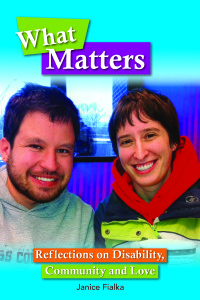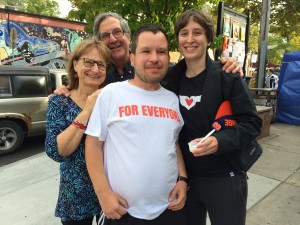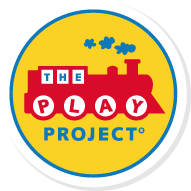
By Onna Solomon, LMSW, Certified PLAY Project Consultant & Lead Trainer
Janice Fialka is a social worker, advocate, and mother of an adult son with intellectual disability. She has been a mentor to quite a few PLAY Project Consultants over the years (myself included). Her new book, What Matters: Reflections on Disability, Community and Love, is a profoundly important and moving collection of essays, articles, and poems about her family’s experience. Included in the collection are essays about her children and members of her community who supporter her family’s quest for meaningful inclusion for her son.
Janice writes eloquently about how she and her family grappled with a system that gave her son Micah such labels as “low I.Q.”, “unemployable,” and “not-a-student.” The book documents the family’s advocacy that led to Micah’s full inclusion since elementary school, despite the labels assigned to him. It also documents how, during college, Micah challenged discrimination in the federal court (and won), how he moved 300 miles from his home to become a teaching assistant at Syracuse University, and most recently, how he survived heart surgery.
What I appreciate most about the book is Janice’s ability to offer practical advice to parents and professionals while also reflecting on her most vulnerable moments as her family learned how best to build a community of support around Micah. She tells her son’s story with pride and, at the same time, honestly portrays the difficult emotions parents feel when grappling with raising a child with disabilities.
I had a chance to talk with Janice about this book, which is the culmination of decades of advocacy and community-building. She told me that part of the process of putting the book together was discussing it with Micah: “It is very important that he was okay with the things that I was talking about”. Below is an excerpt of our conversation, edited for length.
What do you wish you could tell yourself 26 years ago, knowing all that you know now?
I want to say to myself: the range of feelings you experience are all valid and real. There will be waves of worry and wonder and appreciation and joy and fear that cycle around. Another piece of advice is to be with other families who have had this journey…the need to keep reaching out to others is one of the lessons that I re-learn. [In the beginning] I found talking with parents who had children a bit older than Micah was really helpful. The section of the book that people often make reference to is “Learning to Ask For Help.” Now, it truly is an honor when I get phone calls from parents or when I do workshops and they tell me, “Oh, now i know what to do next” or “I know I’m going to be okay.” The other thing is that when I listen to parents I get so much from them as well. They validate my own experience. I feel that sense of community…that’s the thing about asking for help – it really is what builds community. So, if there was one lesson: don’t fret so much about asking for help.
 Your daughter, Emma, is now a teacher in an inclusive classroom. It is interesting to see how her life and career have been shaped by her brother’s intellectual disability. I loved hearing an adult sibling’s perspective. What parts of her contributions to the book surprised or struck you?
Your daughter, Emma, is now a teacher in an inclusive classroom. It is interesting to see how her life and career have been shaped by her brother’s intellectual disability. I loved hearing an adult sibling’s perspective. What parts of her contributions to the book surprised or struck you?
What surprised me was that when I asked to to write the forward, she said, “Of course I want to write this!” and she did it with great thought, but also very quickly. I think she was right to share some of her story because she is both a sibling and a teacher, so she has seen it from many perspectives. Which is why she is such a gift to our family and so many other families. She has this innate understanding that teachers need to have high expectations for their students with disabilities and she knows that you have to have concrete skills and knowledge to reach toward those high expectations. You can’t just be a nice person – you have to do the work to find the right tools for the child. She will say to parents: “Your child needs these supports in order for them to grow. And if your child isn’t able to do that, it is not that the child is failing, it is that we in the classroom haven’t figure out what to do next.” If something is not going well with a student, she gets together with her team and asks the questions: what is this student telling us that we need to pay attention to? She also understands that learning takes place outside of the classroom as well. As Micah’s sister, she is accepting of the range of feelings that she has about having a brother with a disability – it’s not always easy, and, the way she says it, just like parents have a range of emotions, siblings do too.
There is so much hope and celebration in this book, but there is also a lot of struggle. What messages do you want to give parents who are struggling?
There can be a lot of disappointment, frustration, and aggravation in building a meaningful life for all of our children, but especially our children with disabilities. Because I have been connected with people who have an expansive view, I’ve learned that systems are often inadequate in responding to what is needed. It’s not that we don’t continue to fight to improve that in creative ways, but it’s really going to be the community work that will more likely get the support we need. We cannot simply rely on systems or institutions, because so often they are overburdened or the professionals are not trained adequately. So I would say that I try to keep the tension between what is realistic and what dreams drive us forward…Young disabled activists taught my family that disability has its own history, it’s own culture. We started to learn that there is a social model and a medical model, and in the social model there is an identity that is not a deficiency, it’s a different way of being in the world. Taking away that stigma was really transformative for all of us. It is an identity we can embrace. My poem, “Puddles to Pride,” shows that different way of thinking about disability. That takes time: as a parent, you don’t just find out the life changing news and immediately get to the place of being proud. It’s a process, but the goal is to try to find meaning in the life changing news of having a child with a disability.
Check out the book:
What Matters: Reflections on Disability,Community and Love
http://danceofpartnership.com/books.htm
facebook.com/whatmattersinclusion
Upcoming Events with Janice Fialka – 2017
- Conversation and Book Signing at Book Beat, Oak Park, MI – March 26, 2017, 2-4pm. http://www.thebookbeat.com/backroom/2017/02/10/conversation-with- janice-fialka-at- book-beat- sun-march- 26th/
- Conversation and Book Signing at Huntington Woods Library, MI – April 12, 20177-8:30pm http://huntington-woods.libcal.com/event/3148422?&hs=a
- Michigan DEC Conference in Mt. Pleasant, MI – April 28, 2017 Keynote by JaniceFialka and Micah Fialka-Feldman http://www.michigandec.org/event.php?ID=20
- 2017 National Early Childhood Inclusion Institute – Chapel Hill, NC – May 9-11,2017 Keynote and Book Signing http://inclusioninstitute.fpg.unc.edu/
